“Men can starve from a lack of self-realization as much as they can from a lack of bread.” –Richard Wright
We all identify with a group culture of some kind or other. It may be on the basis of our skin color, history, nationality, political persuasion, religion or even social class. It is how we get our cultural identity in the world and a way for us as humans to experience that sense of belonging. The culture we identify with, brings a richness to our lives, as we live out the traditions of our forefathers, and as we adhere to the expected behaviors be they religious, political or even dietary.
Food as it happens plays a huge part in our cultural identity. Consider for a moment kosher and halal laws of the Jewish and Muslim faiths. In these examples cultural identity dictates how your food is slaughtered and prepared prior to eating, and in both cases what is adamantly forbidden. This reinforces the sense of cultural identify every day and at every meal if you happen to be Jewish or Muslim and it strengthens that sense of cultural identity. Other cultural groups have dietary restrictions such as the Indian avoidance of beef, or Jains avoidance of meat, eggs and even root vegetables (lest the smallest of life be disturbed while pulling the vegetable from the ground). Of course it is not just food that creates the sense of community and belonging but it is surely one of the most important.
Culture can also have a dark side. Consider Syria where the protests of the majority were deemed reprehensible by the ruling regime when its culture and status felt threatened. So began the systematic and deliberate breakdown of the community by the weaponization of food and a reign of terror. There was no attempt to hide that the siege of Aleppo was an attempt at forced starvation to the beleaguered occupants. When starvation was not working fast enough bombardment by Russian bombs and regime chemical weapons brought the city to its knees and to ruins. Food the source of community and belonging used as a tactic and weapon of war!
People with a fractured sense of community unable to partake in the most basic of necessities such as a family meal may suffer a loss of belonging. This fracture is a contributing factor that almost 5 million people fled Syria in the course of the civil war to date, braving a treacherous Mediterranean and an unknown future. The dark side of culture awaiting the arrival of tired and weary men, women and children on some European shores in the guise of barbed wire and water cannons posed no deterrent…these were desperate people looking for that sense of belonging and community with no choice but to keep moving until they felt safe.
Syria was one of the original 7 countries under the initial immigration ban issued recently by the White House. The latest executive order revision is an equal opportunity discriminator ensuring Syrian refugees will now be banned for 120 days like the other 5 countries and not for an indefinite period as in the original order.
Admittedly, my knowledge of the countries impacted by the current ban was limited at best. While I chose to delve a little deeper to understand the dangers that drive a people to take such desperate measures. Chef Hari Pulapaka, Orlando’s very own celebrity chef, local farm supporter/advocate, and co-owner with Dr. Jennifer Pulapaka of Cress Restaurant, chose a route he knows best – host a 7 Course – 7 Countries charity dinner, served family style, in honor of the 7 Countries listed in the immigration ban – Iran, Iraq, Syria, Yemen, Libya, Somalia, and Sudan.
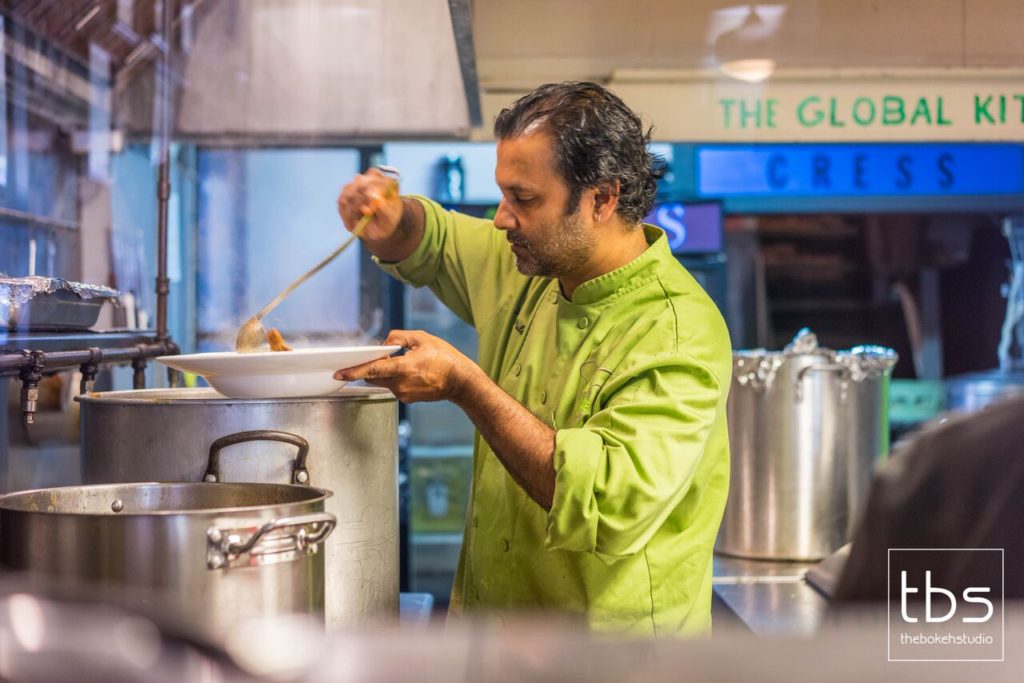
Syria was of particular interest. We all saw from the luxury of our first-world armchairs the lifeless bodies of men, women and children wash ashore on remote Mediterranean beaches, a harrowing sight! You will see that Syria features more prominently in the following pages, the intention is not to overlook the suffering of people from the other 6 countries but to highlight one with the awareness the others are so very similar.
Syria: The recent history of the Syrian people is marked by the Syrian government’s violent crack-down on protestors involved in anti-government protests in 2011, resulting in an ongoing brutal civil war. The Assad regime with support from the governments of Iraq, Iran and Hezbollah and logistic support from Russia since September 2015 remains in power. Consequently, the Syrian people stuck between a rock and a hard place fled the horror and to date there are almost 5 million refugees of which according to Aljazeera 2.4 million are children. The Assad regime weaponized food in an effort to regain control of Aleppo one of the cities under siege by cutting off food supplies. Finally, with the help from indiscriminate bombing by the Russians and reputed chemical weapons usage by the Assad regime Aleppo was again under government control by December 2016. Since the start of the war it is reported by Al Jazeera that over 450,000 Syrians have been killed, 1 million injured and over 12 million Syrians displaced from their homes.
It is highly unlikely that many Syrians other than the pro regime faction have had the opportunity to enjoy their customary meals in the peace and quiet of their own homes in a long time.
1st Course:
- Ocala Honey Labneh (Syria)
- Split Pea & Cici Humus (Syria)
- Flatbread (Yemen)
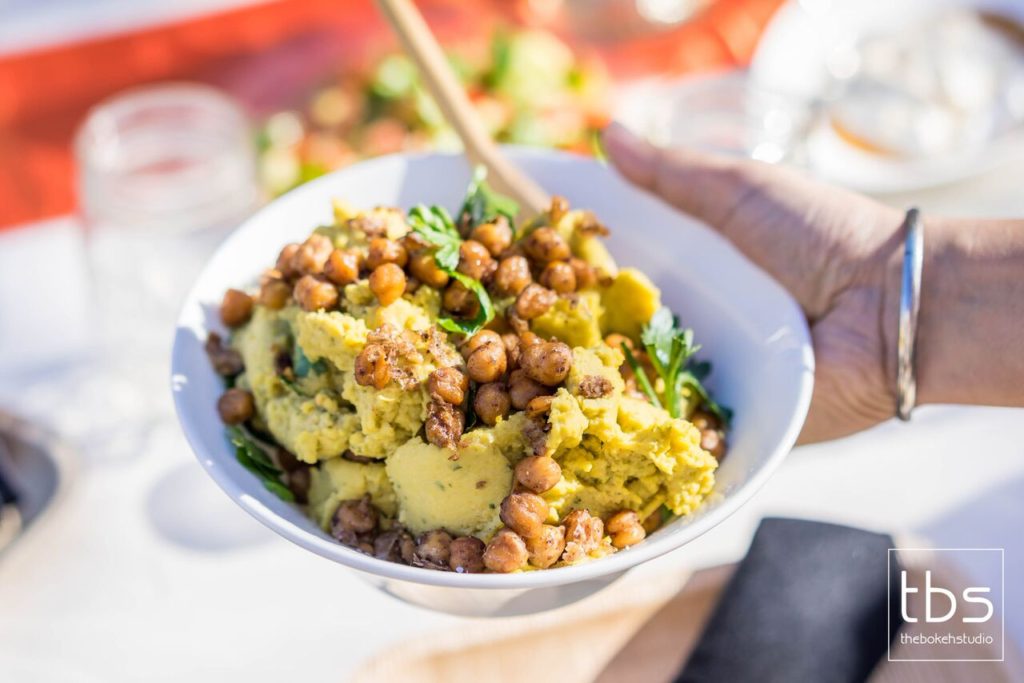
In normal conditions Syrian appetizers or meze are presented very informally with several choices to whet the appetite. The West is quite familiar with many of the offerings such as hummus, baba ghannouj (mashed grilled eggplant), that may be used as dips or spreads. Za’atar swirls made with wild thyme, tangy sumac and toasted sesame seeds are enjoyed by all ages. Syrians also love Lahamajin which are small meat pies of lamb or beef on flatbread made spicy to one’s own taste. A final example from the many meze options is Tabbouleh, made from parsley, tomatoes, onions and bulgur and seasoned with olive oil, lemon juice and salt. Yum! From kebabs, Bami (okra stew), Chicken Fatti, or Samaka Harra (fish stuffed with sun dried peppers and walnut), a traditional Syrian meal offers a variety of choices, catering to even the pickiest of eaters.
2nd Course:
- Ful, Spices, Parsely. (Sudan)
3rd Course:
- Wagyu Beef and Potato Kubba (Iraq)
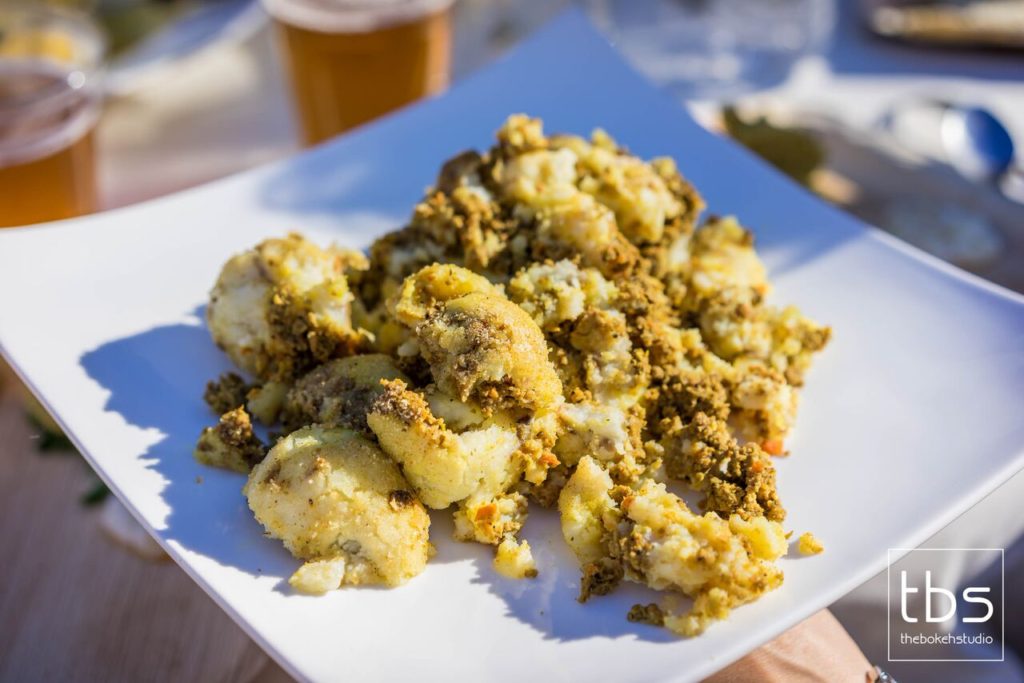
Libya: A failed Arab Spring uprising in Libya in 2011, resulted in chaos and civil war. A new government backed by the United Nations in 2016 is currently in power. Traditional Libyan cuisine derives much from the traditions of the Mediterranean, North Africa (Tunisian cuisine), and the Middle East (Egyptian cuisine).
4th Course:
Barefoot Farmer tomato and English Cucumber Shirazi Salad (Iran)
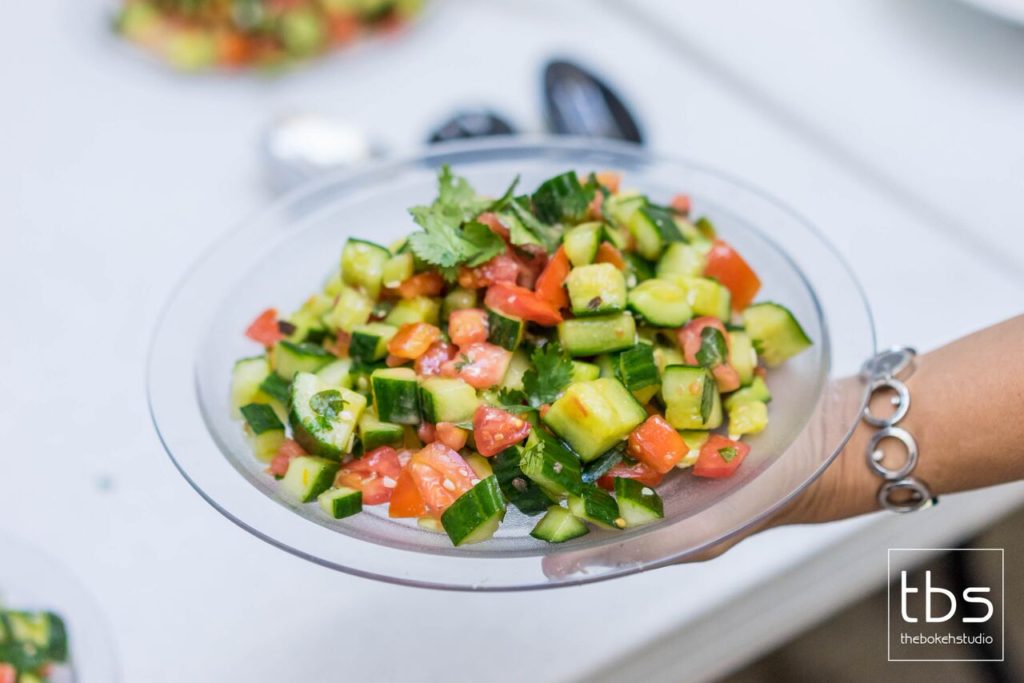
5th Course:
- Polow (saffron, raisins, cashews) Iran
- Roasted Corvina, spices, olive oil. Iraq
- Camel-Duck kebab, cilantro (Libya)
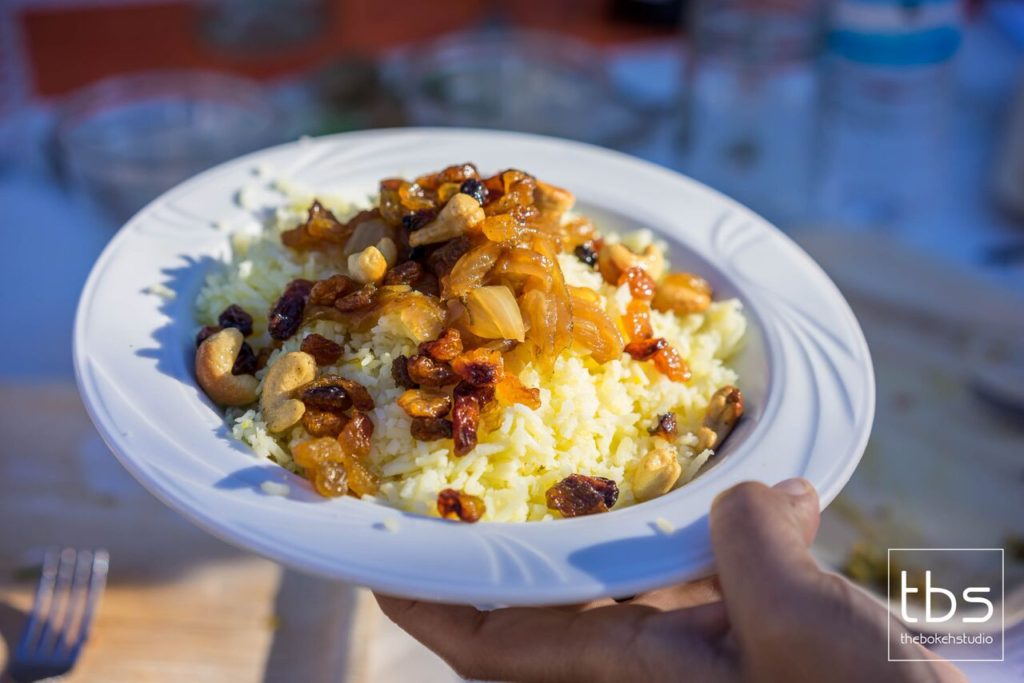
Yemen engulfed in the throes of civil war has Yemeni people flee to the rural areas to avoid this constant bombardment. With no work available and little food, UNICEF has reported that close to 500,000 children are malnourished. Impending famine from an unbroken drought is expected to take matters from dire to critical during this year. Usual suspects include a perennial favorite lamb, chicken, basmati rice, saffron, cinnamon, cardamom, yogurt, and various breads including kobhz and malawah.
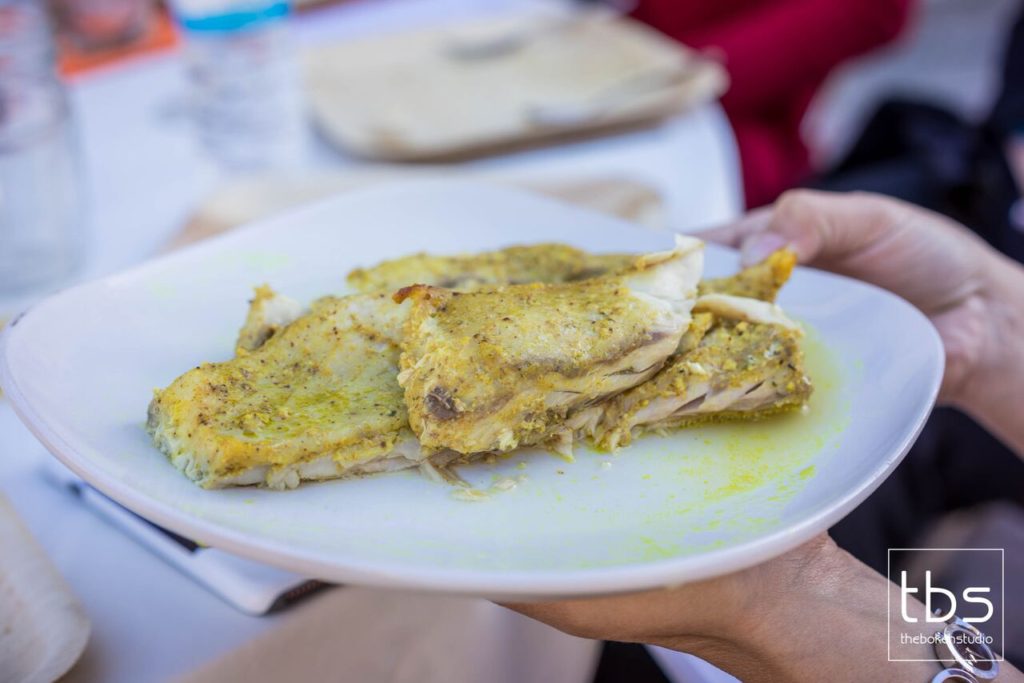
Somalia’s new central parliament sworn in 2012 presented an opportunity of a return to peace to a country recently embroiled in civil war and continued clan violence. Numerous other issues such as severe poverty that according to the UN affects more than 60% of the population (of which more than 62% are age 24 & under), unclean drinking water, poor sanitation, malnutrition, lack of healthcare, and limited education, all need to be addressed eventually.
The largest refugee camp in the world – Dadaab sits on the border of Kenya and Somalia, home to hundreds and thousands of Somali refugees fleeing from violence and hunger over the last 20 years. When Somalis have access to food, meat is the predominant choice. Goat and sheep are available but camel is preferred. Camel milk while not used for drinking is used to make butter and jinow – a yogurt.
6th Course:
- Lamb Maraq, spices (Somalia)
- Barefoot Farmer Veggies, couscous (Syria)
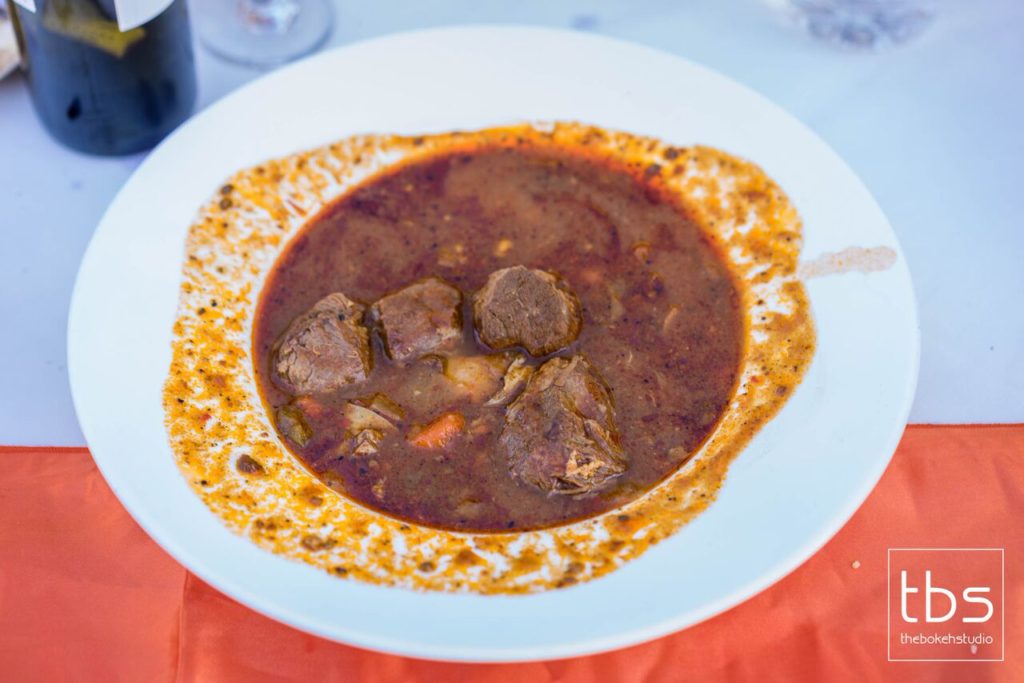
Sudan and South Sudan endured one of the longest and bloodiest wars in all of Africa and included government organized and sanctioned genocide in western Darfur. It remains one of the poorest countries in the world. South Sudan seceded in 2011.
Sudanese people favor a flat bread usually made from corn and called kisra. Asida or aseeda is staple of South Sudan and commonly made from sorghum, red millet or corn and is eaten frequently with meals. Stews and soups may contain peanut butter, offal and dates.
7th Course:
- Saffron Rice Pudding, rose water, dates. (Iran)
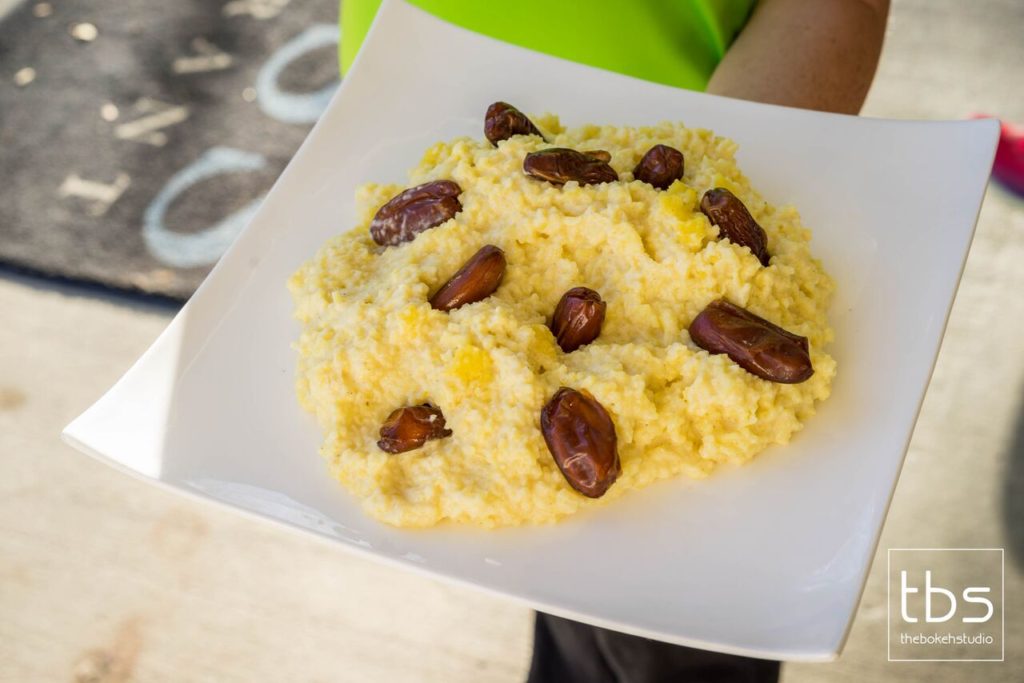
Iran had a long history of outside interference that was not deemed beneficial for the Iranian people. Kebabs, flatbreads, nuts, fruit-and herb filled cuisine are popular in Iran. Fesenjan a stew of walnut, poultry and pomegranate is said to go back to at least 515 BC.
Iraq: Iraqi culinary heritage is steeped in history dating back some 10,000 years – from the Sumerians, Akkadians, Babylonians, Assyrians to ancient Persians. Tablets found in the ruins left by these ancient peoples show recipes prepared in the temples during religious festivals – perhaps the first cookbooks in the world?
Pork is forbidden, as is alcohol. Wheat, barley, rice and dates (Iraq is the world’s largest producer of dates) are the staple foods of Iraq, and a combo of meat and grain forms the basis for most dishes. Baharat a melange of spices utilized to spike up an Iraqi meal include cinnamon, cloves, nutmeg, cumin, coriander, raisins and paprika. Interestingly, Iraqi National dish consists of a grilled fish – Samak Masquf. Due to the different climatic zones of Iraq, the country produces a myriad of fruits. Northern cool temperatures harbor apples, pears, peaches, plums and all types of nuts; hot and humid south call 120 kinds of dates home; while in the hot and dry center, some of the world’s best and sweetest melons flourish.
It might be wise to remember a quote Maya Angelou is credited with; …people will forget what you said, people will forget what you did, but people will never forget how you made them feel.”
My heartfelt thanks to Cress Restaurant for their “7 courses 7 Countries” meal that featured cuisines from the above countries, shepherded our little corner of the world (300 people), while highlighting into focus the harrowing plight of their peoples. I was honored and proud to break bread with you.

Standing Ovation: Cress Restaurant proudly donated $10,000 to International Rescue Committee. (IRC responds to the world’s worst humanitarian crises & helps people to survive, recover & gain control of their future).
The extra food from the event was picked up by First United Methodist Church.
Food Photography: Bokeh Studio
Food Writers: Ms. Barnes and Ms. Primlani.
About Author
You may also like
-
First Look at the Trials & Tribulations Facing Orlando’s Local Independent Restaurants During the Covid-19 Pandemic. #orlando
-
Reopening Restaurant Dining Rooms in Orlando. Here is What You Need to Know! #pandemic #orlando
-
How to Celebrate Easter in Orlando! #easter #orlando #covid19
-
Healing Powers of a Home-Cooked Comfort Meal! #covid19 #stayathome #india
-
Family Friendly Recipes to Try While We #Stayathome! #bread
4 thoughts on ““7 Courses – 7 Countries”: A Travel Ban Inspired Charity Dinner!”
Comments are closed.
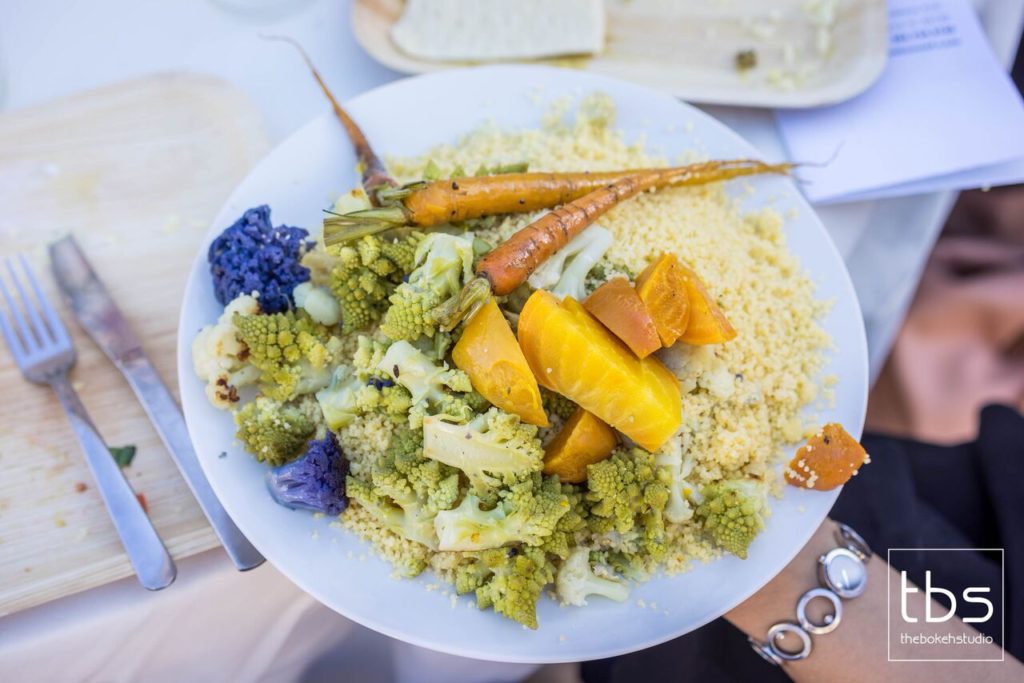

Wonderful recap of this fantastic event. Hari and Jenneffer Pulapaka truly outdid themselves. I wish I could have been there to experience such a beautiful example of food bringing people together.
Much appreciated you stopping by Christina!! Cheers!
Ms Primlani/Barnes,
A brilliant, inspirational, informative and beautifully composed article.
We don’t often take the time we should to realize how incredibly fortunate we are while millions upon millions and suffering and dying around the globe.
With the current Muslim Ban our government has initiated those who have suffered the most, mainly the Syrians and Somolians, we are helping not only the least, but punishing them more.
Thanks for publishing this timely and most worthy article.
This effort is unique and very commendable. Let’s hope other institutions/organizations/nations take a leaf out of your actons ..